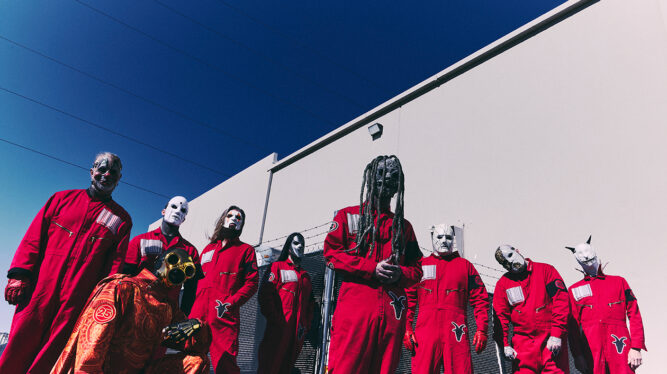When Slipknot first contacted Cedar Ridge Distillery, which is located 120 miles from the band’s hometown of Des Moines, Iowa, management was not interested in an alternative metal whiskey brand inspired by scary clowns. Until one of the owners forwarded the Slipknot email to employees. “Oh, my God, Slipknot — are you kidding me?” came the overwhelming response. “We have to do this.”
The result, Slipknot No. 9 Reserve Whiskey, which debuted in 2019, represents the shattering of a “glass ceiling” in the heavy metal business, according to Cory Brennan, Slipknot’s manager. Metal-branded products were once taboo; today, they’re no-brainers. “For so long, the gatekeepers were scared of anything aggressive and scared of metal and scared of their audiences. Over the past 15 years, that’s really changed,” Brennan says. “More and more people are open to the genre. They’re kids, adults. Some are grandparents at this point. And they’re loyal. They’re not going away.”
Artists from all genres rely financially on fan bases who buy product. Metal audiences tend to be loyal for years, even decades — and that loyalty translates into revenue for long-running legacy acts. Iron Maiden built a worldwide branded-apparel business out of its logo and skeletal Eddie the Head mascot.
“Pop comes and goes. Metal stays consistent,” says Barry Drinkwater, executive chairman of Global Merchandising Services, which works with Iron Maiden, Guns N’ Roses and others.
The revenue proportions in the metal world are different from those of pop or hip-hop. Marketing and selling albums remain important for the bands’ labels. Brian Slagel, owner and chairman/CEO of Metal Blade Records, home of Mercyful Fate, Sacred Reich and many others, says the 42-year-old indie label makes 25% to 30% of its revenue from vinyl album and CD sales, and the rest from streaming, although only the genre’s biggest stars are racking up substantial royalties, such as Metallica and Black Sabbath, which have both crossed the 1 billion stream threshold.
Most metal acts, however, rely on touring and merch. “Merchandise on the road is probably the No. 1 source of our income,” says Keith Wampler, frontman for The Convalescence, a symphonic horror death metal band from Toledo, Ohio.
Drinkwater adds, “Eighty percent of it is a black T-shirt.” Metal merch sales boomed during the coronavirus pandemic, when fans stuck at home turned to online shopping. In July 2020, August Burns Red guitarist Brent Rambler found himself shipping hundreds of packages from the basement of his house to fans who were spending money on merch instead of live shows. “A lot of tape and scissors,” he recalls. The group soon hired a fulfillment company to help with the orders and built a thriving online store. “It has fully replaced the income almost of doing a full tour,” Rambler adds. “We say it’s the silver lining of the pandemic.”
The strength of merch sales has since helped bands weather the post-pandemic inflation that has hiked up the prices of buses, crew, hotels and gas and cut into the profit margins of groups with smaller fan bases.
Meanwhile, the genre’s marquee acts are thriving. Metallica sold 1.2 million tickets last year, grossing $125.8 million, according to Billboard Boxscore. And Cannibal Corpse drummer Paul Mazurkiewicz says, “We’re doing the best we’ve ever done. A lot of bands talk about the tough time touring and the costs and all that, but we don’t see any of that.”
New headliners are also emerging, says Hatebreed frontman Jamey Jasta, who bought the rights to the dormant Milwaukee Metal Festival and rebooted it in 2023. Knocked Loose, Lorna Shore and Slaughter To Prevail are among the bands that have drawn massive live crowds despite repertoires with “almost no melody,” Jasta says. “We had [all three] headlining on a Sunday. It was the biggest day and outdrew [more established bands] Lamb of God and Machine Head.”
And while metal acts have yet to master TikTok the way pop star influencers have, their fans’ social media posts often heighten their visibility and drive discovery. Slagel calls TikTok “vitally important,” and says metal bands that distance themselves from the app wind up dominating it anyway. “I went to see Cattle Decapitation and Immolation in Dallas. Both bands were telling me there were a lot of younger fans there that they haven’t really seen [before]. I said, ‘Well, it’s TikTok.’ And they said, ‘We’re not on TikTok!’ ” he recalls. “But your fans are on there,” he told them, “and they’re hashtagging Cattle Decapitation and posting videos.”
The key to long-term success, say veteran metal stars, is to keep touring and recording, as well as taking control of their masters. Testament, founded in 1983, made a deal with indie Megaforce Records in the mid-’90s to license its recordings rather than sign over the rights, and is awaiting the reversion of its earlier Atlantic Records masters after 35 years, according to U.S. copyright law. “The label’s like, ‘Have you ever looked at your numbers?’ We have close to 3 million listeners a month on Spotify,” frontman Chuck Billy says. “I was like, ‘Holy smokes!’ All the publishing rights, everything goes to us. We rode the storm out and stayed together. We’re still out there touring pushing the music — now we own it.”
The multigenerational consumer demand for metal and the avid loyalty of its fans may lead to multi-million-dollar catalog sales. Now that Mötley Crüe and KISS have sold their publishing catalogs for hundreds of millions of dollars, heavier bands are optimistic. Publishing companies have been “knocking on our door,” Billy says.
“I hear Judas Priest and Van Halen on car commercials, I hear bands that we grew up with on commercials,” he adds. “Ten or 15 years from now, it might be Testament.”
https://www.billboard.com/pro/heavy-metal-music-genre-report-brand-deals-merch-sales-tiktok/



